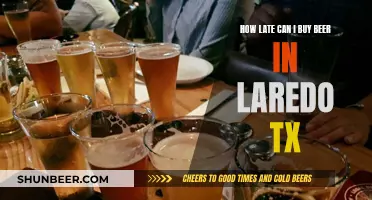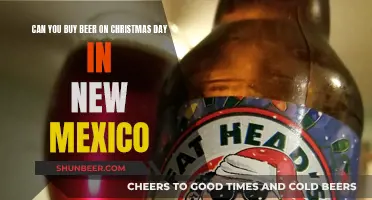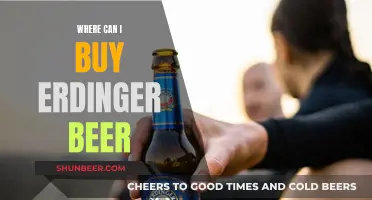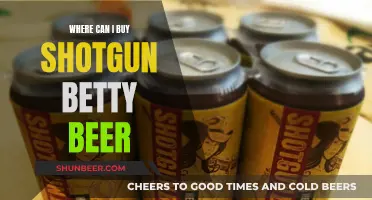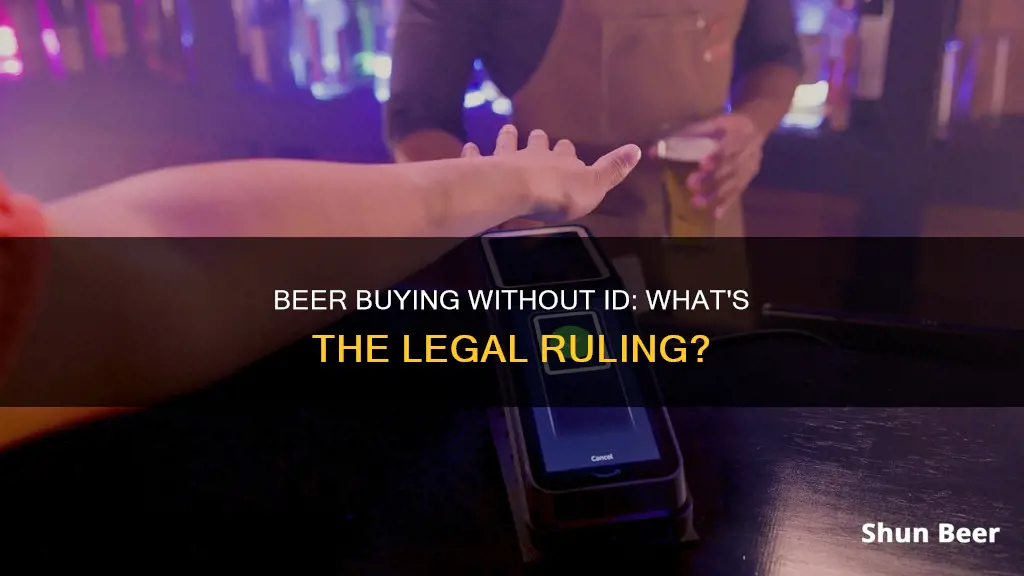
Whether or not you can buy a beer without your ID depends on where you are. In the United States, for example, the legal drinking age is 21, and some states require everyone in a group to show ID before alcohol can be purchased. In other states, it is up to the vendor to decide who must provide ID. In the UK, you don't need ID to buy alcohol under 0.5% ABV, but pubs, bars, and shops often treat alcohol-free drinks the same as alcoholic drinks.
Can you buy a beer without your ID?
| Characteristics | Values |
|---|---|
| Alcohol-free beer | In many places, you need an ID to buy alcohol-free beer. |
| Alcohol-free beer ABV | Alcohol-free beer contains less than 0.5% alcohol by volume (ABV). |
| Alcohol-free beer in the UK | In the UK, you don't need an ID to buy alcohol under 0.5% ABV. |
| Alcohol-free beer in the US | In the US, the laws vary from state to state. For example, in Ohio, you must be over 18 to buy alcohol-free beer, whereas in Oregon, West Virginia, and Wyoming, you can't buy it if you're under 21. |
| ID policies | Many stores have adopted an "ID everyone" policy to avoid liability. |
What You'll Learn
- Alcohol-free beer may still contain trace amounts of alcohol
- Alcohol-free beer is treated like alcoholic beer in many shops and bars
- Some states have different rules about buying alcohol-free beer if you're under 21
- Retailers restrict the sale of alcohol-free beer to avoid promoting alcohol to children
- Retailers restrict the sale of alcohol-free beer to make it easier to enforce rules regarding alcoholic drinks

Alcohol-free beer may still contain trace amounts of alcohol
Non-alcoholic beer is not always completely alcohol-free. In the United States, brewers can label beer as "non-alcoholic" even if it has small amounts of alcohol. The threshold for non-alcoholic beer is 0.5% ABV. This low percentage of alcohol is similar to what you might find in some fruit juices, breads, and ripe bananas. While it's not enough to get you drunk or cause a hangover, it's also not accurate to say that non-alcoholic beer is entirely free of alcohol.
The alcohol content of non-alcoholic beer, or "near beer," can vary. Classics like O'Doul's contain up to 0.4% ABV per serving. Craft brewers like Athletic Brewing Co. label their cans as "less than 0.5% ABV," allowing some flexibility for variables during fermentation. For comparison, a standard beer typically has around 5% ABV, while IPAs average closer to 6-7% ABV.
Even big brands like Heineken 0.0, Budweiser Zero, and Guinness 0.0, which market their products as alcohol-free, may contain trace amounts of alcohol. This is because the brewing process for most non-alcoholic beer is similar to that of regular beer, using the same basic ingredients and fermentation processes. The difference lies in the specific type of fermentation used to remove alcohol at the end, which varies by brewer. Controlled fermentation methods are the most popular, where fermentation is cut off early to control for a lower ABV. However, this method may still leave trace amounts of alcohol in the final product.
Other brewers use dealcoholization methods to remove alcohol from the brew. This can be done by heating the alcohol to its boiling point, adding water to dilute the product, or using vacuum distillation. These methods are similar to those used for dealcoholized wine. While these processes aim to eliminate alcohol, it is challenging to remove it entirely, and trace amounts may remain.
The presence of trace amounts of alcohol in non-alcoholic beer has implications for certain consumers. For example, while non-alcoholic beer is generally considered safe for pregnant women, there is no official "safe" level of alcohol consumption during pregnancy. As measuring ABV in beer is not an exact science, pregnant women may prefer to avoid non-alcoholic beer altogether. Additionally, non-alcoholic beer is not recommended for recovering alcoholics or individuals with a history of alcohol abuse, as even the smell or taste of beer can trigger cravings and lead to a potential relapse.
The sale of non-alcoholic beer to minors has also been a topic of discussion. While drinks under 0.5% ABV are not legally considered "alcohol" in most regions, including the UK and many US states, they may still be restricted in pubs, bars, and shops. This is done to avoid promoting alcohol to children and to make it easier to enforce rules regarding alcoholic drinks. While it may be frustrating for adults who want to purchase non-alcoholic options, retailers prioritize society's best interests by voluntarily restricting the sale to protect children from the potential dangers of alcohol.
Buying Beer Late at Night in California: What's Allowed?
You may want to see also

Alcohol-free beer is treated like alcoholic beer in many shops and bars
Alcohol-free beer is often treated like its alcoholic counterpart in many shops and bars. This means that retailers may refuse to sell these beverages to customers who cannot prove they are above the legal drinking age. This restriction also applies to sales outside of licensing or alcohol sale hours.
There are two main reasons for this. Firstly, retailers want to avoid promoting alcohol to minors. Alcohol-free beer packaging and the drink itself are almost indistinguishable from alcoholic beer. Therefore, allowing minors to buy it could indirectly promote similar alcoholic products to them. Secondly, treating alcohol-free and alcoholic drinks similarly makes it easier for retailers to enforce rules regarding alcoholic drinks. This is especially relevant in pubs and bars, where owners are responsible for what people drink on the premises.
Some people find it annoying to be asked for ID when buying alcohol-free beer, especially if they don't have it on them. However, retailers are focused on society's best interests by voluntarily restricting the sale of these drinks to protect children from the dangers of alcohol.
In most regions, including the UK and many US states, drinks under 0.5% ABV aren't legally considered "alcohol" and aren't subject to the same restrictions as alcoholic drinks. Everyday foods and drinks, such as ripe bananas and bread, contain similar amounts of alcohol and aren't restricted. Despite this, many retailers choose to treat alcohol-free drinks like alcoholic drinks to avoid promoting alcohol to minors and to simplify enforcement.
Lexington Beer Laws: Can I Buy Alcohol?
You may want to see also

Some states have different rules about buying alcohol-free beer if you're under 21
The laws surrounding the purchase of non-alcoholic beer vary across the United States. While federal law prohibits the sale of alcoholic beverages to those under 21, non-alcoholic beer is a little more complicated. This is because, despite containing less than 0.5% alcohol by volume (ABV), non-alcoholic beer is still regulated by the Federal Alcohol Administration Act.
However, as the legal drinking age is not a federal rule but a state-level decision, the laws vary across the country. While some states, such as Oregon, West Virginia, and Wyoming, treat non-alcoholic beverages the same as regular beer, others, like Ohio, allow those under 21 to purchase it, as long as they are over 18. In some states, like Alabama, the rules are even more complex, with "wet" counties allowing sales to minors, while "dry" counties do not.
Even within states, the rules can vary, with some counties and cities imposing different age restrictions. Retailers may also have their own policies, often choosing to restrict sales to those over 21 to avoid fines or the loss of their alcohol license.
In addition, while some states may allow the sale of non-alcoholic beer to minors, they may still restrict its consumption to those under 21. For example, in most states, minors can only consume non-alcoholic beer with parental permission or in the presence of a parent or guardian.
Minors and Non-Alcoholic Beer: Australia's Legal Perspective
You may want to see also

Retailers restrict the sale of alcohol-free beer to avoid promoting alcohol to children
Alcohol-free beer is usually treated the same as alcoholic beer by retailers, pubs, and bars. This means that they will not sell these drinks to anyone who cannot prove they are of legal drinking age. This is despite the fact that in most regions, drinks with an alcohol by volume (ABV) of under 0.5% are not legally considered alcohol and are therefore not subject to the same restrictions as drinks with a higher ABV.
Some retailers have stated that they restrict the sale of alcohol-free drinks to minors because they do not want to give the impression that people under the legal drinking age are being permitted to purchase products that contain alcohol. They also want to avoid any mix-ups that could result in alcohol being sold to minors.
Spotted Cow Beer: Illinois Availability and Where to Buy
You may want to see also

Retailers restrict the sale of alcohol-free beer to make it easier to enforce rules regarding alcoholic drinks
Alcohol-free beer is often treated the same as alcoholic beer by retailers, pubs, and bars. This means that alcohol-free beer is not sold to those who cannot prove they are of legal drinking age, and it is also not sold outside of licensing or alcohol sale hours.
There are two main reasons for this:
- To avoid promoting alcohol to children: Alcohol-free beer may not contain much alcohol, but its packaging and appearance are almost indistinguishable from alcoholic beer. Many alcohol-free and non-alcoholic beers are produced by companies that also produce alcoholic drinks. Allowing minors to buy alcohol-free beer could indirectly promote similar products that contain alcohol.
- To make it easier to enforce rules regarding alcoholic drinks: The packaging of alcohol-free beer is almost identical to that of alcoholic beer. In pubs and bars, it is the owner's responsibility to monitor what customers are drinking. By treating alcohol-free beer the same as alcoholic beer, it becomes easier to ensure that alcoholic drinks are not accidentally sold to minors.
Retailers are focused on society's best interests by voluntarily restricting the sale of alcohol-free beer. Their ultimate aim is to protect children from the dangers of alcohol.
UAE Beer Buying Guide: Where to Purchase Legally
You may want to see also
Frequently asked questions
No, you need to show ID to prove you are above the legal drinking age.
Even if you are buying alcohol-free beer, you may still need to show ID. Alcohol-free beer is treated the same as alcoholic beer in many pubs, bars and shops. This is to avoid promoting alcohol to children and to make it easier to enforce rules regarding alcoholic drinks.
In some places, if you are buying alcohol with a group, everyone in the group must show ID. This is to avoid liability and to prevent the sale of alcohol to minors.


